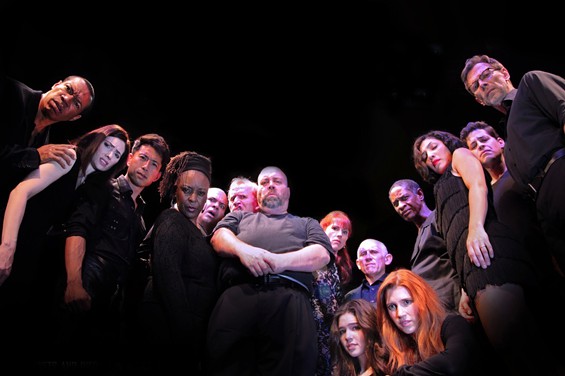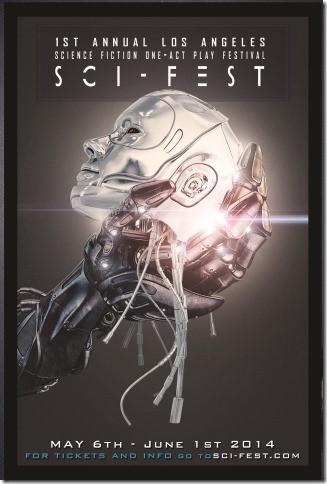
"We're right now in the middle of an interesting riddle," David Dean Bottrell, the actor-producer behind Sci-Fest, the city's inaugural festival of science fiction one-acts, says just two weeks before his brainchild's May 6 premiere at Hollywood's Acme Theater. "We're working out how to make our actors float in space."
These kinds of logistics are just one reason sci-fi is a genre far more identified with Hollywood soundstages than L.A.'s more intimate theaters - in fact, Sci-Fest's producers believe their festival to be the first of its kind, anywhere. Without the benefit of gimmicks like CGI or suspension wires, its nine one-act plays, ranging from 10 minutes to just over half an hour in length, must roam though worlds as diverse as Manhattan apartment buildings, the deep woods and deep space, for encounters with the ever-popular apocalypse, time traveling and alien creatures. A few of the plays are outright comedic, and a couple Bottrell swears are truly chilling. The fest's centerpiece is an adaptation of Ray Bradbury's 1949 short story "Kaleidoscope" - the one in which seven astronauts must free fall through the outer reaches of space - which Bottrell describes as "Gravity without the happy ending."
"Kaleidoscope" has been staged twice in the United States - on the radio in the 1950s and as a Reader's Theatre production about a decade later. Bottrell believed it "needed to go more upscale, be more innovative" for its 2014 reboot, a feat that Bottrell says they'll somehow pull off with just creative lighting, particular stage configurations and more than a little athletic ability of its actors.
But reviving a classic tale written by a sci-fi legend was in keeping with a desire on the part of Sci-Fest's producers for the entire project to evoke the feel of an old Twilight Zone episode, and a nod to the storytelling tradition that live theater embodies so well.
"Theater depends on two things," Bottrell says, "the writing, and engaging the audience's imagination."

The festival itself was born almost by accident. Despite gigs acting on the likes of True Blood and Space: Above and Beyond, Bottrell is a late-blooming geek, one who didn't fully appreciate what a genre icon Ursula K. Le Guin is when he first came across her short story "The Wife's Story" a couple years ago. But he was immediately captivated by the idea of giving the work a dramatic interpretation. "I remember thinking, you couldn't turn this into a piece for TV or film, because that would ruin the surprise ending," he says. "But you could put it up onstage."
When Le Guin gave Bottrell and his producing partners permission to stage the story, Bottrell conceived of the larger festival, for which producers ultimately had to wade through more than 400 submissions and raise just over $80,000 on Kickstarter. Tony Award - winning actress L. Scott Caldwell then signed on to narrate the Le Guin piece, a short short told in the first person. Actors Tim Russ (Star Trek: Voyager), James Kyson (Heroes), David Blue (Stargate: Universe) and Dan Castellaneta (aka Homer Simpson), along with a number of other Hollywood types hailing from properties such as The X-Files, Supernatural, Fringe and The Hunger Games, round out the casts of two complete nights of rotating one-acts.
"Science fiction actors often get offers to play the same character over and over again," Bottrell says. "They were excited to do something new. People cleared their schedules for this."
Though far from a theater staple, science fiction is no longer such a stranger to L.A. stages, with productions lately popping up across town, including at Visceral Company, Sacred Fools and even Center Theatre Group's Kirk Douglas Theatre. The Douglas is where The Nether, Jennifer Haley's take on a futuristic virtual reality, premiered; next season it goes up Off-Broadway. L.A. doesn't have a lock on the trend - Portland, Ore.'s Jack London Bar recently hosted Pulp Gulp, a night of live sci-fi playlets.
"Science fiction has gone through a lot of transitions," says Bottrell, charting the genre's evolution from pulpy magazines to Hollywood's global action hero. But at its core, it's always "about human beings imagining their future. That's why it's relevant now and will always be relevant."
